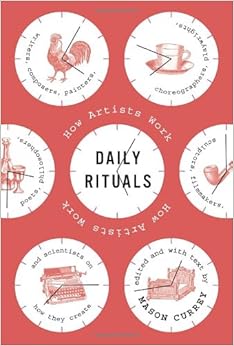Mason Curry has written a book about the daily rituals of creative people. His best advice after learning how the most creative produce:
Take a walk every day.
'I was really struck by how many great writers, artists and composers took a walk alone with a piece of paper in their pockets to take down notes. Seems to be incredibly valuable for so many people throughout history that I think we could all benefit from that.
Yes!
Nashville: Take a walk!
Nashville Drivers: Give them a break!
***
There are only 24 hours in a day, but it sure seems like certain people are able to do way more with their time than the rest of us. Some of us barely have time to do the laundry, while others write plays or compose symphonies.
Mason Currey writes about 161 creative minds, among them are painters, composers, philosophers and poets, in his book, "Daily Rituals: How Artists Work." He finds that many of these artists and geniuses accomplished so much each day because they used their time wisely and efficiently, and practiced rituals.
"People would find that a certain habit was associated with a period of productivity or great insight and they would often, kind of relentlessly stick to that one ritual in a sort of superstitious fashion believing that it somehow enabled their creativity," Currey says.
***
NPR article:
The Onion published an essay recently called "Find The Thing You're Most Passionate About, Then Do It On Nights And Weekends For The Rest Of Your Life." The piece was satire, but it's how many of us respond to the question Mason Currey raises in his entertaining new book, Daily Rituals: How Artists Work. "How do you do meaningful creative work," he wonders, "while also earning a living?"
A product of the author's now-defunct blog, Daily Routines, Daily Rituals assembles the regimens of 161 assorted creative geniuses into a lean, engaging volume. Its brief entries humanize legends like Hemingway and Picasso, and shed light on the working lives of less popular contemporary geniuses, like painter Gerhard Richter, choreographer Twyla Tharp and illustrator Maira Kalman.
The book makes one thing abundantly clear: There's no such thing as the way to create good work, but all greats have their way. And some of those ways are spectacularly weird.
Nikola Tesla typically worked from noon until midnight, breaking at 8:00 p.m. for dinner every night at the Waldorf-Astoria. Among the many peculiarities of this ritualized repast was his practice of not starting the meal until he had computed his dinner's cubic volume, "a compulsion he had developed in his childhood." Truman Capote, who wrote lying down in bed or on a couch, refused to let more than two cigarette butts pile up in an ashtray and "couldn't begin or end anything on a Friday." Louis Armstrong smoked pot ("gage," as he called it) almost daily and couldn't go to sleep until he had taken his dose of a "potent herbal laxative" called Swiss Kriss. "Armstrong believed so strongly in its curative powers that he recommended it to all his friends," Currey writes, "and even had a card printed up with a photo of himself sitting on a toilet, above the caption 'Leave It All Behind Ya.' "

Stephen Kozlowski/Knopf
The prolific Hungarian mathematician Paul Erdos believed that "a mathematician is a machine for turning coffee into theorems." And indeed, if there's a drug the artists in Daily Rituals can agree on, it's caffeine. Soren Kierkegaard preferred his coffee with sugar, or perhaps it was vice versa: "Delightedly he seized hold of the bag containing the sugar and poured sugar into the coffee cup until it was piled above the rim," his biographer observed. "Next came the incredibly strong, black coffee, which slowly dissolved the white pyramid."
In addition to detailing peculiarities, Daily Rituals, as the name suggests, also tracks the ordinary routines some of the greatest minds in history employed to negotiate the daily grind.
James Joyce, we learn, woke daily around 10:00 a.m. He'd lie in bed for about an hour, then get up, shave and sit down at his piano, where he'd play and sing before writing in the afternoon and then hitting the cafes later that evening. John Updike, meanwhile, worked mornings, preferring to "put the creative project first," as he put it. Of his discipline, he said, "I've never believed that one should wait until one is inspired because I think that the pleasures of not writing are so great that if you ever start indulging them you will never write again."
Charles Darwin boasts one of the book's strictest schedules. After a stroll and breakfast alone, Darwin would begin a 90-minute work session around 8:00 a.m. He'd break to read mail with his wife and then return to his study around 10:30 a.m. for a second session. By noon or so, he'd have completed what he considered his workday, but the rest of his waking hours were no less regimented. He responded to letters, read and rested at regular intervals until bedtime, which arrived daily around 10:30 p.m. "Thus his days went for forty years," Currey writes, "with few exceptions."
Some of the creative feats mentioned in the book seem godlike. P.G. Wodehouse, for instance, wrote the last 8,000 words of Thank You, Jeeves in a single day. He was bested by William Faulkner, who once wrote 10,000 words between 10:00 a.m. and midnight. But these are exceptions to the rule, and there's something reassuring about the way most of Daily Rituals' towering artists and thinkers struggle with the always difficult, occasionally miserable creative process.
It even tests someone as preternaturally prolific as Joyce Carol Oates. "Getting the first draft finished," she once said, "is like pushing a peanut with your nose across a very dirty floor."
Links:
http://www.marketplace.org/topics/business/daily-rituals-creative-people?utm_source=feedburner&utm_medium=feed&utm_campaign=Feed%3A+APM_Marketplace+%28APM%3A+Marketplace%29
http://www.npr.org/2013/04/30/179286560/daily-rituals-of-the-brilliantly-creative




No comments:
Post a Comment